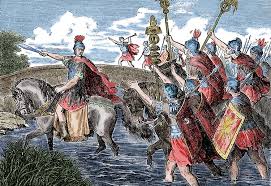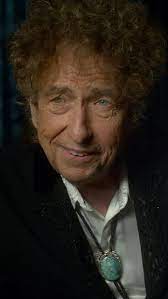Hi folks! Please click on ‘Watch on You Tube’. Please LIKE and SUBSCRIBE when you get there!
THE TEXT
Crossing the Rubicon is constructed in a very regular pattern, with nine verses of four lines each. Dylan’s vocal is especially nuanced, depicting the conflicting extremes of decisiveness and indecision between which the narrator is continually being thrown. The narrator appears to be planning some kind of revenge, which he describes in particularly bloody terms. He seems to be experiencing considerable trepidation with regard to the decisions he needs to make but continually stresses that his actions have been forced upon him. In the first three lines of every verse he struggles with his conscience and tries – with varying degrees of success – to justify himself. He is forever brooding on the potential consequences of his actions. His continual insistence that he has ‘crossed that Rubicon’ is so overstated, however, that it may be that he is merely indulging feverish fantasies.

The title refers to a well documented historical event when Julius Caesar made the decision to cross the river that marked the boundary of the territory ruled directly by Rome. Caesar knew that his decision would lead to civil war. The triumph of his troops over those of Pompey led to the extinction of the Roman republic, which had existed for over 400 years, and the creation of a dictatorship which later became a massive and long lasting empire. Thus the crossing over the river came to represent a crucial moment at which the future destiny of Rome and its dominions was decided.

CROSSING THE RUBICON
The phrase has since come to symbolise any situation in which a potentially life changing decision has to be made. The first lines of the song: …I crossed the Rubicon on the 14th day of the most dangerous day of the year/ At the worst time, at the worst place, that’s all I seem to hear… are delivered in Dylan’s characteristic ‘blues snarl’. The way he crams in the syllables in the first line indicates a certain level of panic, as if he is worried that his actions may have indeed been rather rash. In the second line he slows down a little while he complains that others have been trying to persuade him that the time is not right to act. Thus the song begins with a deliberate statement of defiance. In reality five years passed between the crossing and the murder. Caesar was, however, killed on the Ides of March (the 15th) so perhaps historical time has been collapsed here for dramatic purposes. The implication seems to be that the narrator will be in some kind of imminent danger as soon as he takes his ‘fatal action’.

When Dylan follows this with…I got up early so I could greet the Goddess of the Dawn… he makes an odd little ‘gulping’ sound in anticipation. So far his pronouncements have been consistent with the ‘Julius Caesar’ persona. One might well imagine Caesar beginning his campaign with an invocation to Aurora, the Roman Goddess of the Dawn.

JULIUS CAESAR
But soon the narrator is already adding various mythical and literary associations: …I painted my wagon, abandoned all hope and I crossed the Rubicon… To ‘paint one’s wagon’ is an expression of readiness for action, popularly associated with the 1969 movie of the same name, adapted from Lerner and Loewe’s 1951 musical. In Dante’s Inferno the words …Abandon all hope ye who enter here… are inscribed on the Gates of Hell.

DANTE’S INFERNO
It is already clear that the Rubicon is a symbolic rather than a real location. In a couplet rich in alliteration, we are informed that …the Rubicon is a Red River, going gently as she flows/ Redder than your ruby lips and the blood that flows from the rose… The first line, with its capitalised ‘Red River’, sets up an association with Red River Shore’s mysteriously indefinable heroine. The second line associates the image of ‘ruby lips’ – a common cliché in romantic songs – with Blake’s paean to sexual corruption The Sick Rose. The narrator seems to be clearly stating that the river he has crossed represents a torrent of sexual jealousy. He also seems to be suggesting that the river will one day run with the blood of his enemies. This recalls Macbeth’s confession that:
…I am in blood
Steeped in so far that, should I wade no more,
Returning were as tedious as go o’er…

The following lines are among the most resonant in the song, mixing wry humour with terror of the unknown: …Three miles north of purgatory – one step from the great beyond… takes us back into ‘hellish’ territory …I prayed to the cross, I kissed the girls and I crossed the Rubicon… is a memorable juxtaposition of the sacred and the profane. Now the narrator seems to be a soldier again, preparing to go off to war. One can almost imagine him as a medieval Crusader. But Crusaders were meant to kiss the cross, not ‘the girls’, before battle. The lightly ironic tone of the line is more suggestive of a GI departing for World War Two. We may already suspect that the narrator’s positioning himself as some kind of military figure is a fantasy. In the manner of so many blues songs, a pattern of loose associations is set up. The narrator is trying to convince us that he is a powerful figure capable of wreaking revenge on his enemy. But we sense that the boasting and strutting will have no effect.

The narrator positively wallows in his own degradation, while continuing to mutter threats. At first he is relatively calm and philosophical …What are these dark days I see in a world so badly bent?… he asks. The phrase ‘badly bent’ appears in Little Walter’s 1964 tongue in cheek lament Dead Presidents (written by Billy ‘the Kid’ Emerson and Willie Dixon) which mentions the death of William McKinley, whose assassination in 1901 begins Key West. The narrator appears to be sinking into a mood of regret: …How can I redeem the time – the time so idly spent… The tempo of the song increases as the narrator then sinks into a fit of jealousy: …I feel the bones beneath my skin and they’re trembling with rage… he tells us. Then he becomes especially petulant: …I’ll make your wife a widow, you’ll never see old age… and growls his general disillusionment with all humanity: …Show me one good man in sight that the sun shines down upon… He tries to convince us that he is ready for the coming battle with his usurper: …If I survive then let me love, let the hour be mine… before apparently attempting to set up a meeting place for the coming confrontation: …Take the high road – take the low – take the one you’re on… But these lines, which come from the Scottish ballad The Bonnie Banks o’ Loch Lomond, tend to undermine the seriousness of his declarations.

At the end of each verse the narrator maintains his determination to ‘cross the Rubicon’. He states that …I embraced my love and put down my head… …I pawned my watch and I paid my debts… and …I poured my cup and I passed it along… This suggests that the narrator is steeling himself for some kind of transformation. It is as if his soul, or his inner conscience, is at war with itself. At times he appears to take on the persona of an ancient Roman general, whereas at others he slips into the realm of the mundane. His ‘crossing’ may be taken to symbolise various difficult decisions. The mention of sharing a cup references the Last Supper, as if the narrator is comparing himself to Jesus before his trial and crucifixion. But the earlier statements of intent, such as ‘pawning a watch’ have already undercut such intimations.

The narrator continues to attempt to summon up the courage to take the decisive step that he seems to be finding so difficult. He makes a particularly strong accusation: …You defiled the most lovely flower in all of womanhood… which he follows with …Others can be tolerant, others can be good… strongly inferring that the object of his revenge is a vicious rapist to whom he will show no mercy. He gets down to some gruesome specifics: …I’ll cut you up with a crooked knife and I’ll miss you when you’re gone… But he does not sound angry here, merely world weary …I stood between heaven and earth… he sighs …and I crossed the Rubicon… Meanwhile, the insults continue: …You won’t find any happiness here, no happiness or joy… is hardly surprising in this context. But the object of the address appears to have shifted: …Go back to the gutter and try your luck… he sings …find yourself some nice young pretty boy… It seems that he is now addressing the woman who has left him, but in a tone that is almost childishly spiteful. By now we have heard many threats, but there is little evidence that any of them have been, or really will be, carried out.

The tone of weariness is sustained until the end of the song, even as the narrator tries desperately to summon up some much needed courage: …I feel the holy spirit inside… he declares …and see the light that freedom gives/ I believe it’s in the reach of every man who lives… He appears to have got the threats out of his system but now he is clutching at straws. There is little likelihood of him wreaking the revenge he is promised. He sounds broken, defeated …Keep as far away as possible… he mutters, as if giving himself an instruction that negates everything he has said so far …it’s darkest ‘fore the dawn… In quoting this well known if entirely fallacious proverb, which also appears in Meet Me in the Morning on Blood on the Tracks, he now appears to be in fear of the consequences of his actions. At the end of the line Dylan mutters a tiny and almost inaudible …Oh Lord!… which sounds like a cry of despair. The line that follows tells us that …I turned the key and broke it off. And I crossed the Rubicon… as if he is indeed attempting to open a gate rather than cross a river.
In the last verse the narrator finally addresses a character by name: …Mona baby, are you still in my mind, I truly believe that you are… This is a considerable surprise, given that Mona is a character who is briefly mentioned in 1966’s surreal odyssey Stuck Inside of Mobile (With the Memphis Blues Again) where she advises the singer to avoid the ‘railroad men’ who …drink up your blood like wine… Stuck Inside of Mobile consists of a stream of consciousness of bizarrely comic images, all relating to its narrator being trapped ‘in the wrong place at the wrong time’. In that song Mona seems to represent ungrounded fears or paranoia. Now it seems she is standing at the singer’s shoulder again. Perhaps the entire discourse of the song has been a product of the narrator’s paranoia. After all, as he tells us …Couldn’t be anyone else who’s come with me this far… It may be tempting to believe that this is the voice of Dylan himself, looking back over his inner emotional and creative life. In order to begin to be creative one must always be prepared to ‘cross the Rubicon’. On the other side of that river one may find inspiration or love or merely despair. But sometimes it seems that one may need an ‘army’ in support to have the strength to make the crossing. In the final haunting lines of the song Dylan sounds almost unbearably fatigued, as if he is about to drift into a very troubled ‘series of dreams’: …The killing frost is on the ground… he sighs …and the autumn leaves are gone… Then there is a return to ‘looking east’ where the sun will rise, although by now darkness has clearly descended: …I lit the torch and I looked to the east and I crossed the Rubicon…

While Stuck Inside of Mobile – which was written during a period when Dylan found that inspiration could come easily to him – is a playful series of surreal jests about not being able to escape from a ‘hellish’ situation, in Crossing the Rubicon Dylan – like the protagonist of Can’t Wait – trembles at the entrance to a hell of his own making. In Mississippi Dylan had written about the fear of ‘drowning’ in doubts about his own abilities. Here he again confronts his fear of losing touch with his sources of inspiration.
No longer so sure that he can summon up the ‘freewheeling’ imagery of songs like Stuck Inside of Mobile, he confronts a kind of existential terror. He is still ‘three miles north of purgatory’, contemplating the mysteries of the ‘undiscovered country’ in which new creations can be forged. He realises that he has no choice but to continue crossing that river to explore ‘the great beyond’. To fail to do so would be a kind of spiritual and creative death. So he will have to wake up every morning, pay his respects again to the goddess of the dawn and continue to make that crossing over and over again, no matter how difficult and painful that process may be. The track ends with a tortured blues guitar solo from Charlie Sexton which expresses the struggle that the song communicates.
LINKS….
STILL ON THE ROAD – ALL DYLAN’S GIGS



Leave a Reply